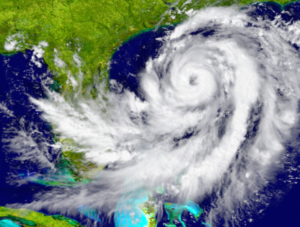To pitch, or not to pitch
Imagine this. You work for an organization that plans to open a new location or introduce a new product. In addition to the work that was done for the new initiative, you and others have prepared all the necessary publicity materials and you have a list of reporters ready to contact. A few days before the big event, a hurricane makes landfall and wreaks havoc in several southern states. Your options are to wait a few days to let the weather story work itself through the news cycle, OR, to reach out to the media as planned, since life goes on and hurricanes in the parts of U.S are to be expected during the late summer/early fall.
Which option to choose depends. For significant weather events, such as a hurricane, depending on the severity of damage and if casualties are high, waiting a few days or more is probably a wise choice. If the damage to people and property is minimal, then you can send out your news, as planned. While there is always something going on in the world, more often than not, there will be a news gap that needs a story and your pitch can fit that gap.
However, if the news event in question deals with the death of a prominent person or is something more tragic like a school shooting or an act of terrorism, it is best to be respectful of what’s going on in the newsrooms and wait more than a few days. My associate, Ilena, was working at a bio-medical research facility when the September 11, 2001 terrorist attacks occurred. Prior to that that she was promoting the facility’s cancer research. When the terrorist attacks happened, the news media was focused on the attacks and its aftermath for the remainder of September 2001. She resumed her media outreach efforts during the month of October, when the news coverage had ebbed somewhat and news outlets were beginning to report on other things.
Yet, regardless of terrorist attacks or other significant events there will be times when you can’t wait to send out your news. If a crisis situation arises and you need to reach out to the media, sooner is better. Employees and members of the community around your business need to know what happened and how, if at all, it affects them. Also, if your business is publicly traded, reporting news such as quarterly earnings is required by law, despite the mayhem that may be going on in the world.
What if your boss is anxious to get the news out about the company’s new product, despite the news media being focused on a tragic event? Under these circumstances, it is best to explain that now isn’t the best time since the media’s attention is elsewhere. Sending out your news when the time isn’t right, risks your company being seen as tone-deaf to world events and could result in negative publicity if your company is called out on social media for promoting a product after a tragic event.
It is frustrating when after months of planning, something happens that leads to a delay in your public relations campaign. But sometimes, waiting for the media’s focus on a particular news event to fade is necessary. Once it does, then your news will be welcomed by journalists who are looking for fresh new story angles to cover.

